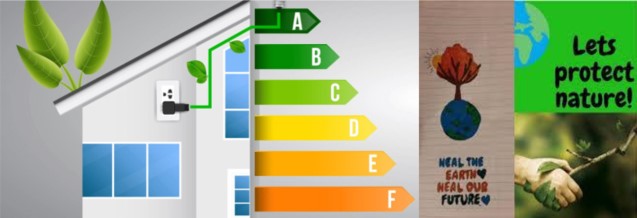- Definition and Types of Energy
- Myths And Misconceptions About Energy
- The Relationship Between Energy and Environment
- Climate Change and Carbon Footprint
- Greenhouse Gas Effect
- The Role of Human-Induced Greenhouse Gases and Energy Consumption
- Energy Efficiency and Sustainability
- Renewable Energy Sources and Future Perspectives (video)
- Play and Learn
- Solar Energy Conversions
- Solar Energy Worldwide
- Solar Energy in Partner Countries
- Positive and Negative Impacts
- Technologies for Harnessing Solar Energy
- Solar thermal energy technologies and applications
- Electricity Generation Methods
- Passive Heating and Cooling of Residences with the Sun
- Concentrator solar power (CSP) systems and electricity generation
- Systems and Applications That Generate Electricity directly from solar rays
- Photovoltaic Cells and Panels
- Domestic PV Systems
- Off-Grid PV Systems
- Hybrid Connected Systems
- Materials Used in PV Cells
- Play and Learn
Energy Efficiency and Sustainability
Energy efficiency refers to reducing energy consumption per unit of output without sacrificing performance. This approach optimizes energy use while supporting environmental sustainability. Key benefits include:
- Reduced greenhouse gas emissions.
- Lower energy costs for households and industries
- Improved national energy security


Energy efficiency is an approach to provide less energy consumption per unit of product or service in all sectors such as industry, transportation, agriculture and housing without any reduction in production quantity and quality. This approach not only optimizes energy use, but also supports environmental sustainability and makes significant contributions to the protection of natural resources.
Energy efficiency applications reduce greenhouse gas emissions by reducing fossil fuel consumption and thus become an effective tool in combating climate change. In addition, while supporting the household economy by reducing individuals' energy costs, it also increases energy security by reducing energy imports throughout the country and contributes to the reduction of the current account deficit. On the other hand, energy efficiency encourages technological innovations and modernization processes. For example, replacing old equipment with more efficient and environmentally friendly technologies that consume high energy both improves production processes and facilitates the achievement of sustainable development goals Ref . Therefore, energy efficiency should be considered as one of the basic elements of development policies by providing environmental, economic and social benefits
